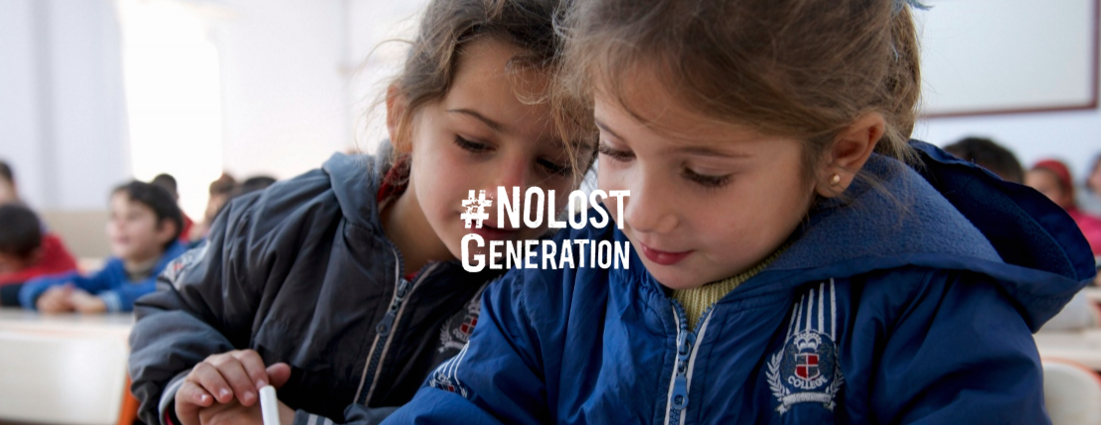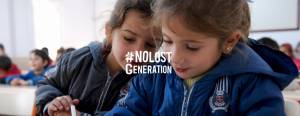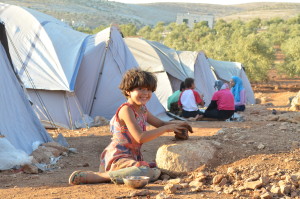‘No Lost Generation’
 Source: UNICEF
Source: UNICEF
The Syrian war is inescapable. We see it everywhere in the media. We hear of the violence taking place, with indiscriminate killings. We hear of the refugees pouring into Europe by the thousands. We hear of the thousands more who live in refugee camps in the Middle East and Europe. We hear of the starvation of those stuck in conflict areas. In all this mess, it’s hard to think of the future.

In midst of the conflicts and atrocities, children represent a glimpse of hope and the untold stories of those caught in the middle of politics and violence. They are an embodiment of innocence and purity. They have limited capacity to defend themselves, recognize their interests, or act in defiance. Children inevitably bear the intolerable consequences of a war they have no part of.
There is not a Syrian child whose life has not been impacted by this war. Over six million children are in need of humanitarian assistance. These children are in a desperate situation. And yet, we still profess “children are the future”. We depend so greatly on the idea that it will be the youth who will lead the way to a more prosperous future. What if they cannot? What if, through the process of war and conflict, we lose this generation?
This is a critical issue facing Syria’s future: who will lead it? How can we ensure that such proclaimed potential of this generation is still intact?
Education.
In 2013, it became clear that the Syrian crisis would a ‘prolonged conflict’. It also became abundantly clear that action needed to be taken to ensure that children would not be completely derailed from their development. There are currently 2.1 million children that are out of school inside Syria and 700,00 Syrian children void of any form of education. As such, education programming was prioritized and targeted.
The ‘No Lost Generation’ campaign began in 2013 to articulate real concerns about a ‘lost’ generation of Syrians. Without proper access to education, the livelihoods of the Syrian would be degraded and opportunities stolen from them. The effects of violence and displacement have disrupted their lives, but one day they will grow up and seek opportunities to rebuild them. At this critical time, it is of paramount importance that they will be able to do so.
Education is the key in offering these children an alternative to their current situation. Without it, they will be limited for their entire lives. In terms of programming, responses have been called upon by the 5 refugee hosting countries (Turkey, Lebanon, Jordan, Iraq and Egypt). Originally the responses targeted immediate needs on an emergency basis, but more recently they have had to adapt to address more long-term concerns.
There has been a large expansion of temporary education centres, which are being built in refugee camps. Despite the funds being invested in these centres, there is not nearly enough space for all the children to attend. This is the case particularly for those who arrive in host states at later dates; the later you arrive, the less likely you are to access formal education.

Consequently, there has been a need for alternative forms of education programs, which has led to the expansion of informal education. These programs are incomparable to formal education, however in light of the obstacles that Syrian children face, it is for many, the best alternative. These programs typically last 6 months in duration and are often taught in tents or community spaces.
They are not meant to be a permanent solution, but rather temporary learning spaces that can act as a gateway to formal school. As the conflict continues, these informal institutions are becoming more prevalent. UNICEF estimated that by the end of 2015, 27,100 Syrian school-age refugees have relied upon alternative education. In 2016, they foresee an increase to over 80,000.
But it begs the question: is this enough? Are these informal education institutions sufficient to prevent a ‘Lost Generation’? It seems as though these forms of education are unsustainable. They are insufficient in meeting the needs of these children to keep them enrolled and providing the optimal quality of education needed. For example, more than 70% of Syrian refugee children in Lebanon are out of school. More must be done.
Despite the uphill battle these children face, we cannot deny that they still remain the key to the future. They will be pivotal in re-establishing and rebuilding their country. It is unfair to think that due to their current hardships, their lives shall be doomed an ill-fated future. While they take refuge in host states, it is imperative that they are treated with dignity and respect, because values such as these will shape their actions in the future.
As the campaign articulates, we must ensure that there is ‘No Generation Lost’. It is our responsibility to help them find their way to the path that leads to opportunity.
